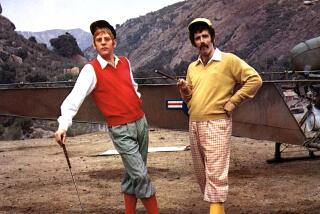On Veterans Day, try to imagine their nights
THERE were only about a dozen people in the Woodland Hills theater the night I saw “Flags of Our Fathers.”
It was a Monday, which I guess isn’t a big movie-going day, but I still expected to see a crowd there, given the combination of Hollywood hype that accompanied its release and the intense patriotism that prevails in the U.S.
Cinelli had a meeting at LACMA, where she’s a docent, so I went alone. She wouldn’t have gone anyway. She avoids the blood fest that war movies invariably offer. It’s bad enough that war even exists, she’s said time and again. She doesn’t have to see it on a big screen.
I went because I had to.
Whether I like it or not, I am drawn like a moth to the flame when a major film isolates a battle that occurred during my youth. The Second World War was a part of my life, the way certain kinds of music or books or radio shows were important during my teenage years. So I bought a hot dog and sat through 132 minutes of hell.
“What was it like?” Cinelli asked when I got home.
I don’t think I said a lot about it because I hadn’t sorted out my thoughts yet. It was too personal. I hadn’t been at Iwo, but I had fought in a war. She didn’t press me on it, and I’m not sure why she hadn’t. Maybe it was the look on my face.
I had a brother-in-law, Bob Johnson, who was in the battle that killed 25,000 human beings in 36 days. He died some years ago after lung cancer was the payback for a lifetime of cigarette smoking. In his final days, when he was still on his feet, he carried a small portable oxygen tank around with him. We’d belly up to a bar in Reno near where he was living and have a drink. Two ex-Marines and an oxygen tank.
He was a good friend as well as a relative, one of the reasons I joined the Corps; just in time, as it turned out, to be shipped to Korea. I don’t recall him actually ever talking about Iwo, except for stories about guys he’d known. Nothing about shredded bodies or the kinds of horrific stuff that resonate in an old soldier’s nightmares.
As war movies go, “Flags” was a chilling experience, but it was still nothing compared with actual footage of the battle I saw some years ago at the home of a retired Marine major. No sound accompanied the 13-minute documentary, but no sound was needed. Like artist Edvard Munch’s “Scream,” faces twisted in pain and terror were evocative enough.
When I think about it now, I can superimpose myself into that battle. We carried the same M-1 rifles in Korea that they carried at Iwo. We had the same close air support from prop-driven Corsairs. We even wore the same camouflaged helmets and yellow leggings. The Chinese called us “yellow legs” because of those silly damned leggings. The Corps couldn’t even afford to buy us combat boots.
I remember one night in Reno with Bob and a friend who’d been in Vietnam. We represented three wars, but no one actually dwelt on them, aside from joking remarks about whose war was the toughest. Thinking about the evening some weeks later, I outlined a play I called “War Buffs.” It was about what human conflict does to guys who start seriously reliving their memories of war. Open the door and the devil comes screaming in. I outlined the drama as a competition among aging warriors: Whose war was best? Whose war was worst?
I never wrote the play. I didn’t have the guts to open the door to the devil. It’s bad enough just always being ajar. Those who come home from Iraq will know that, yes they will.
Director Clint Eastwood’s movie was centered around the six men who raised the flag on Mt. Suribachi. Joe Rosenthal took the photograph for the Associated Press. It became an icon of valor, a postage stamp, a statue in Washington, D.C., a memorial to anyone who ever fought in a war.
When the character of Ira Hayes, who was one of the flag-raisers, was hailed as a hero, he replied, “What I did was try not to get shot.”
There has never been a definitive film about Korea. There probably never will be. Well, yes, there was “MASH,” but that wasn’t exactly about us. Hot Lips didn’t exist in our company of combatants. If someone of Eastwood’s stature and talent ever does offer up a movie about that mess a half-century ago, I’ll probably feel compelled to see that one too.
I’ll come home and Cinelli will look at me and maybe ask about it, but not force the conversation. She’ll see all the memories on my face, in my eyes, in my silence and in the restless thrashing of my sleep. And she’ll know, oh, Lord, what it does to us.
Al Martinez’s column appears Mondays and Fridays. He can be reached at al.martinez@latimes.com.
More to Read
Only good movies
Get the Indie Focus newsletter, Mark Olsen's weekly guide to the world of cinema.
You may occasionally receive promotional content from the Los Angeles Times.







